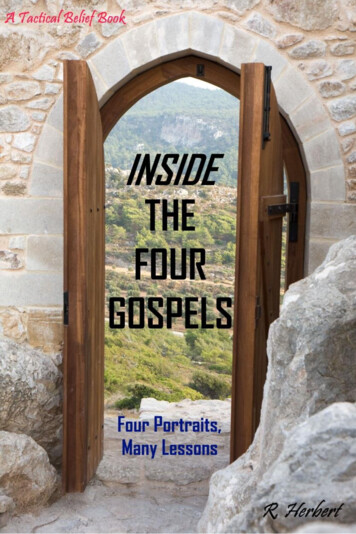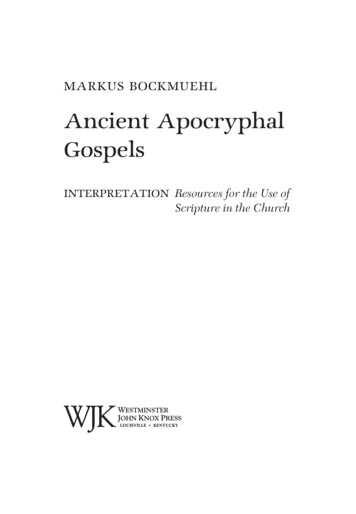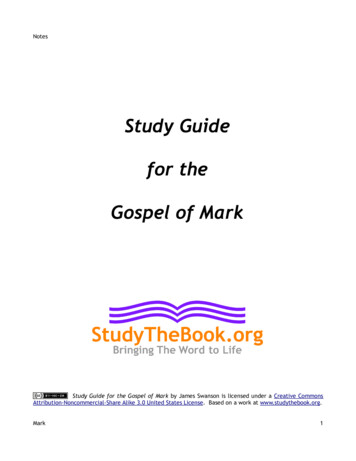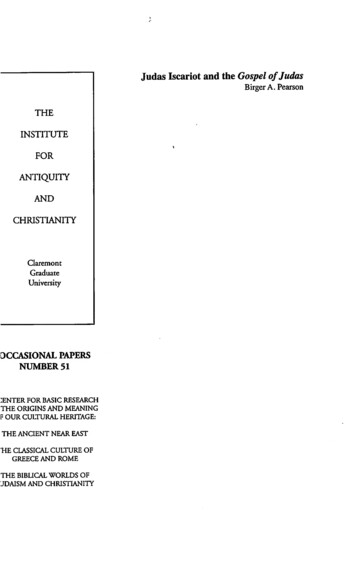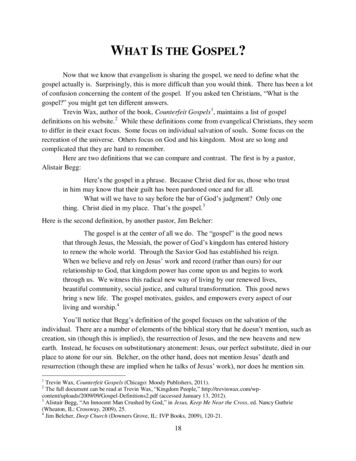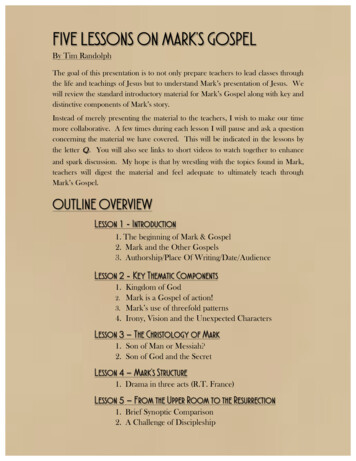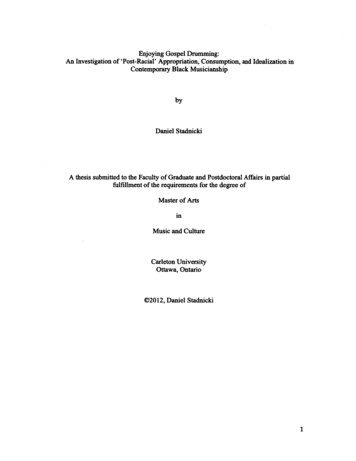
Transcription
The Gospel OfMarkSermon OutlinesThis material is from ExecutableOutlines.com, a web site containing sermon outlinesand Bible studies by Mark A. Copeland. Visit the web site to browse or downloadadditional material for church or personal use.The outlines were developed in the course of my ministry as a preacher of the gospel.Feel free to use them as they are, or adapt them to suit your own personal style.To God Be The Glory!Executable Outlines, Copyright Mark A. Copeland, 2011
Mark A. CopelandThe Gospel Of MarkTable Of ContentsIntroduction To MarkThe Preaching Of John The Baptist (1:1-8)The Baptism Of Jesus (1:9-11)The Temptation Of Jesus (1:12-13)The Preaching Ministry Of Jesus - I (1:14-15)The Preaching Ministry Of Jesus - II (1:14-15)The Call Of Four Fishermen (1:16-20)A Teacher With Authority (1:21-28)At The Home Of Simon And Andrew (1:29-39)Jesus Cleanses A Leper (1:40-45)Jesus Heals A Paralytic (2:1-12)Jesus And The Tax Collector (2:13-17)Jesus Questioned About Fasting (2:18-22)Of Wine And Wineskins (2:22)Lord Of The Sabbath (2:23-28)Hard Hearts And Hard Thoughts (3:1-6)Three Responses To Jesus (3:7-12)The Apostles Of Christ (3:13-19)The Family Of Jesus (3:20-21)The Unforgivable Sin (3:22-30)The True Family Of Jesus (3:31-35)The Parable Of The Four Soils (4:1-20)Take Heed What You Hear (4:21-25)The Parable Of The Growing Seed (4:26-29)The Parable Of The Mustard Seed (4:30-32)Private Teaching And Its Benefits (4:33-34)Jesus Calms The Storm (4:35-41)Who Was Afraid Of Jesus? (5:1-20)Touches Of The Savior (5:21-43)When Familiarity Breeds Contempt (6:1-6)Principles Of Evangelism (6:7-13)Weakness In The Seat Of Power (6:14-29)The Need For Rest (6:30-31)Feeding The Five Thousand (6:32-44)Jesus Walks On Water (6:45-52)The Healings In Gennesaret (6:53-56)The Danger Of Traditions (7:1-13)The Source Of True Defilement (7:14-23)A Gentile Blessed For Her Faith (7:24-30)He Has Done All Things Well (7:31-37)Feeding The Four Thousand (8:1-10)The Savior’s Sigh (8:11-13)Beware Of Leaven (8:14-21)Sermons From The Gospel Of 62656769717375788083858789929496981001022
Mark A. CopelandThe Blind Man At Bethsaida (8:22-26)Who Do YOU Say That Jesus Is? (8:27-30)Mindful Of The Things Of God (8:31-33)The Cost Of Discipleship (8:34-35)The Value Of A Soul (8:36-37)Ashamed Of Jesus And His Words? (8:38)They Beheld His Majesty (9:1-9)Disciples Ask Questions (9:10-13)Jesus Heals A Deaf-Mute Boy (9:14-29)The Way To Greatness (9:33-37)Principles Of Discipleship (9:38-50)Jesus On Divorce & Remarriage (10:1-12)Jesus Blesses Little Children (10:13-16)The Problem With Riches (10:17-27)The Cost And Reward Of Discipleship (10:28-31)Jesus Predicts His Passion And Resurrection (10:32-34)The Cup And The Baptism (10:35-40)Served By Greatness, Serve To Be Great (10:41-45)The Healing Of Blind Bartimaeus (10:46-52)The Triumphal Entry (11:1-11)Cursing And Cleansing (11:12-19)Faith And Forgiveness (11:20-26)Is It From Heaven Or From Men? (11:27-33)The Parable Of The Wicked Vinedressers (12:1-12)Our Duty To God And Country (12:13-17)The Resurrection Of The Dead (12:18-27)Two Great Commandments (12:28-34)David’s Son And David’s Lord (12:35-37)Beware Of Pretentious Scribes (12:38-40)The Widow’s Mites (12:41-44)The Olivet Discourse - I (13:1-23)The Olivet Discourse - II (13:24-37)Four Preparatory Acts (14:1-16)The Last Supper (14:17-26)Jesus Predicts Peter’s Denial (14:27-31)The Garden Of Gethsemane (14:32-42)The Betrayal Of Jesus (14:43-52)Jesus Before The Council (14:53-65)Peter’s Denial Of Jesus (14:66-72)Binding The Hands Of Jesus (15:1)Jesus Condemned And Mocked (15:2-20)The Crucifixion Of Jesus (15:21-32)The Death And Burial Of Jesus (15:33-47)He Is Risen! (16:1-14)Five Views Of Salvation (16:15-16)The Signs That Followed (16:17-20)Sermons From The Gospel Of 1811841861881901931951982012032062082112143
Mark A. CopelandThe Gospel Of MarkIntroductionINTRODUCTION1. “The beginning of the gospel of Jesus Christ, the Son of God”.a. So begins the Gospel according to Mark - Mk 1:1b. The shortest of the four gospels, likely the first one writtenc. Often overlooked because of the gospels of Matthew and Luke2. Yet the Believer’s Bible Commentary notes that because of its brevity.a. Mark’s gospel is an ideal introduction to the Christian faithb. In mission fields it is often the first book translated into a new language[Who was Mark? What makes his gospel unique? Let’s start with.]I. AUTHOR AND DATE OF THE GOSPELA. JOHN MARK.1. Who apparently came from a wealthy familya. His mother was Mary, who had a large house in Jerusalem - Ac 12:121) Some speculate the Last Supper took place in her home (RWP)2) Also that Mark may have been the young man who fled naked - Mk 14:51-52b. His cousin was Barnabas, a Levite from Cyprus - Ac 4:36-37; Co 4:102. Who traveled with Paul and Barnabasa. Starting out on their first missionary journey, but turned back - Ac 13:5,13b. Which caused trouble between Paul and Barnabas - Ac 15:36-41c. He later became a fellow laborer and comfort to Paul - Phe 1:24; Co 4:10-11d. In Paul’s final words, Mark proved “useful to me for ministry” - 2Ti 4:113. Who also accompanied Petera. Who called him “his son” (his convert?) - 1Pe 5:13b. Who was in “Babylon” (possibly Rome) at the time4. Traditions outside the Bible state:a. Mark was an interpreter for Peter - Papias, 130 A.D.b. Mark composed his gospel mostly from Peter’s memoirs - Justin Martyr, 150 A.D.c. Mark went to Alexandria in Egypt where he died in 64 A.D.-- The early and unanimous opinion is that John Mark wrote this gospelB. BEFORE 64 A.D.1. Certainly so, if written by one who died in 64 A.D.2. Barnes suggests between 56 and 63 A.D.3. Some scholars date the book in the early 50’s-- A plausible date would 57-59 A.D. (Bible Knowledge Commentary)[Now for some information about Mark’s gospel in particular.]II. THEME AND OUTLINE OF THE GOSPELSermons From The Gospel Of Mark4
Mark A. CopelandA. ITS THEME OR PURPOSE.1. Written to Gentiles, perhaps Christians in Rome (BKC); note the following:a. Jewish customs are explained - e.g., Mk 7:3-4b. Aramaic expresses are translated into Greek - e.g., Mk 3:17; 5:41; 7:11c. Roman reckoning of time is used - e.g., Mk 6:48; 13:35d. Only Mark identifies Simon of Cyrene as the father of Rufus - cf. Mk 15:21; Ro 16:13e. Few OT quotations are used2. The focus appears to be on Jesus as the Perfect Servant (BBC)a. Mark emphasizes the deeds of the Lord more than His wordsb. He records nineteen miracles, but only four parablesc. The deeds of one who “did not come to be served, but to serve” - Mk 10:45-- Thus one could say that the theme is: “Jesus, Servant of Man”B. A SIMPLE OUTLINE.1. The preparation for Jesus’ ministry - Mk 1:2-132. His ministry in Galilee - Mk 1:14-9:503. His journey to Jerusalem - Mk 10:1-524. His ministry in Jerusalem - Mk 11:1-13:375. His suffering and death in Jerusalem - Mk 14:1-15:476. His resurrection and appearances - Mk 16:1-137. His great commission and continued work from heaven - Mk 16:14-20-- Jesus came from heaven to serve, and returned to heaven to serve![Perhaps of further interest are some.]III. SPECIAL CHARACTERISTICS OF THE GOSPELA. AN EARLY GOSPEL.1. Probably the first one written2. All but 31 verses are quoted in the other gospels3. Leading many to conclude that Matthew and Luke based their gospels on MarkB. A CONCISE GOSPEL.1. The shortest of the four gospels2. Luke has 1151 verses, Matthew 1071, John 879, Mark 6613. Mark’s entire gospel can be read aloud in 1.5 hoursC. A FAST-PACED GOSPEL.1. Over 40 times he uses a word translated “straightway” or “immediately”2. Two-thirds of the verses begin with “and”3. The present tense is used frequently (e.g., they come.He says.He sends.)D. A VIVID GOSPEL.1. Mark presents “lively little touches” not found in the other gospels - Hendriksen2. “.he wrote with all the graphic distinctiveness and vividness of an eyewitness - Erdman3. It may have been Peter’s reminiscences, or perhaps his own, that account for such detailsE. AN EVANGELISTIC GOSPEL.Sermons From The Gospel Of Mark5
Mark A. Copeland1. It opens with “The beginning of the gospel of Jesus Christ.” - Mk 1:12. It closes with “Go into all the world and preach the gospel to every creature” - Mk 16:15CONCLUSION1. What Mark accomplished with his gospel in the first century was significant.a. He left a record of the gospel preached by Peterb. Which emphasized the things that Jesus did - cf. Ac 10:36-39c. That stressed the servitude of Jesus as the Son of Man - cf. Mk 10:452. It can serve an important purpose for us today, reminding us.a. That Jesus came to serve, and continues to serve - cf. He 7:25b. That Christian discipleship likewise involves service - cf. Ga 5:133. Mark’s own life was one of early failure, redeemed by later devotion (Erdman).a. He got off to a rocky start in his service for the gospel of Christb. But he persevered and proved to Paul that he was “useful.for ministry”May his gospel of Jesus Christ, who came to serve, inspire us to become servants who are also:“useful for the Master, prepared for every good work” - 2Ti 2:21Sermons From The Gospel Of Mark6
Mark A. CopelandThe Preaching Of John The BaptistMark 1:1-8INTRODUCTION1. The Gospel Of Mark begins with the work of John the Baptist.a. Which was foretold by Old Testament prophets - Mk 1:2-3b. Which proved to be very successful - Mk 1:5c. Which was cut short by his imprisonment - Mk 1:142. Though John’s work was short-lived, it was clearly important.a. Each of the four gospels preface Jesus’ ministry with that of John’sb. Mark described it as “The beginning of the gospel of Jesus Christ.” - Mk 1:1[To understand the message and ministry of Jesus Christ, we must start with the one sent to “prepare theway of the Lord”. In this study we shall begin by observing what we can regarding.]I. THE PREACHING OF JOHN THE BAPTISTA. HIS PURPOSE.1. To fulfill the prophecy of Malachi - Mk 1:2a. As the Lord’s messenger to prepare His way - Mal 3:1ab. Also concerning the sending of Elijah - cf. Mal 4:5-6; Mt 17:10-132. To fulfill the prophecy of Isaiah - Mk 1:3a. Which was to “prepare the way of the Lord, make His paths straight” - Isa 40:3b. I.e., to prepare people for the coming of the Messiah-- John’s purpose was to “make ready a people prepared for the Lord”B. HIS MESSAGE.1. He came baptizing in the wilderness - Mk 1:4a. The wilderness of Judea - Mt 3:1b. Baptizing in the Jordan River - Mt 3:6c. In Bethabara (Bethany) on the east side of the Jordan - Jn 1:28d. Later, in Aenon near Salim (west side of Jordan), where there was much water - Jn 3:232. He preached a baptism of repentance for the remission of sins - Mk 1:4a. A baptism of repentance, literally “a change of mind”1) Prompted by godly sorrow - 2Co 7:102) Followed by a zealous desire to do right - cf. 2Co 7:11b. A baptism for the remission of sins1) That sins might be forgiven (ultimately through Christ’s death - He 9:15)2) Similar to what Christ and His apostles taught - Mk 16:15-16; Ac 2:38; 22:16-- John’s message called for repentance and baptism for the remission of sinsC. HIS SUCCESS.1. All of Judea, Jerusalem, etc., went to him - Mk 1:5a2. They were baptized by him in the Jordan, confessing their sins - Mk 1:5b-- John’s success may have also included the thief on the cross - cf. Lk 23:39-43Sermons From The Gospel Of Mark7
Mark A. CopelandD. HIS LIFESTYLE.1. Clothed with camel’s hair and a leather belt - Mk 1:6a2. Diet of locusts and wild honey - Mk 1:6b3. John came “in the spirit and power of Elijah” - cf. 2 Kin 1:8; Lk 1:17-- John’s lifestyle reflected the seriousness and sternness of his message (Erdman)E. HIS PROMISE.1. One mightier than he is coming - Mk 1:7a. Whose sandal strap he was not worthy to stoop down and looseb. Note John’s humility and attitude of servitude2. Who will baptize them with the Holy Spirit - Mk 1:8a. Yes, John did indeed baptize with water with repentanceb. But one (Jesus) was coming to baptize with the Holy Spirit!3. This refers to the outpouring of the Holy Spirita. Promised also by Jesus; fulfilled at Pentecost - cf. Ac 1:4-5; 2:1-4,16-17,33b. With lasting effects for all who come to Christ - cf. Ti 3:4-6; 1Co 12:13-- John’s promise bespoke of greater blessings to come![The preaching of John the Baptist was well received by those in Judea and Jerusalem. Those whoreceived his message were well prepared for the coming of the Lord. But I have often wondered.]II. WOULD WE HAVE RECEIVED JOHN’S PREACHING?A. FROM A MAN WHO.1. Required people to go into the wilderness to hear him? - Mk 1:4-52. Dressed and ate like an eccentric hermit (“he has a demon!”)? - Mk 1:6; cf. Mt 11:183. Called religious people coming to be baptized a “brood of vipers”? - cf. Mt 3:7-- Would we have given heed to such a “harsh hermit”?B. I SERIOUSLY DOUBT IT IF.1. We balk at traveling some distance to study God’s Word!a. As when we live far from the church buildingb. Or making the effort to attend both services on Sunday, plus the midweek studyc. Or going to gospel meetings at other congregationsd. What will the Queen of Sheba say of us? - cf. Mt 12:422. We tend to judge people by the clothes they wear!a. Both young and old are quick to judge by one’s appearanceb. We need to remember God’s perspective - 1 Sa 16:7c. Partiality based on appearance makes one a judge with evil thoughts - Jm 2:1-43. We get upset or offended when a preacher points out our faults!a. Some would have preachers to never preach negative sermonsb. But Jesus demonstrated that occasions sometimes call it - cf. Mt 23:13-15-- If these things are true of us today, would we have heeded John then?CONCLUSION1. The preaching of John the Baptist had an important purpose.a. To “prepare the way of the Lord; make His paths straight”Sermons From The Gospel Of Mark8
Mark A. Copelandb. This he did by emphasizing repentance and baptism2. Because of John, people were more likely to heed the call of Jesus.a. To repent of their sins - cf. Mk 1:15b. To believe the gospel and be baptized - cf. Mk 16:15-163. John’s manner of life and style of preaching should not be forgotten.a. For many turn the message of Jesus Christ into a form of “easy-believism”b. John reminds us of the need to bear fruits in keeping with true repentanceAs Jesus would say later, “But why do you call Me ‘Lord, Lord,’ and do not do the things which I say?”(Lk 6:46). Are we showing true acceptance of Jesus as Lord by doing the things He says.?Sermons From The Gospel Of Mark9
Mark A. CopelandThe Baptism Of JesusMark 1:9-11INTRODUCTION1. The baptism of Jesus by John served a significant role in both of their ministries.a. It came at the height of John’s ministry, after which it began to declineb. It served as the beginning of Jesus’ ministry, which soon overtook the ministry of John2. The baptism of Jesus has often raised two questions.a. Why was He baptized?b. Does His baptism reveal the purpose for Christian baptism?[This study will answer these questions, first by reviewing Mark’s account of the baptism of Jesus.]I. THE BAPTISM OF JESUSA. JESUS COMES FROM NAZARETH.1. From Nazareth of Galilee - Mk 1:9a2. Located halfway between the Mediterranean coast and the southern tip of the Sea of Galilee3. Where Jesus grew up - cf. Lk 2:39-52-- About a hundred mile journey to where John was baptizingB. JESUS IS BAPTIZED BY JOHN.1. In the Jordan river - Mk 1:9b2. In Bethabara (Bethany) on the east side of the Jordan - cf. Jn 1:28-29-- The Greek word (baptizo) indicates that the baptism involved immersionC. THE SPIRIT DESCENDS ON JESUS.1. Immediately, just as Jesus comes up from the water - Mk 1:10a2. He saw the heavens parting (“being torn open”, ESV) - Mk 1:10b3. The Spirit descends like a dove - Mk 1:10c; cf. Lk 3:22 (“in bodily form like a dove”)-- Thus the Holy Spirit bears His testimony of JesusD. THE FATHER SPEAKS OF JESUS.1. As a voice from heaven - Mk 1:11a2. Proclaiming: “You are My beloved Son, in whom I am well pleased” - Mk 1:11b-- Thus the Father bears His testimony of Jesus[With such visual and audible effects, the baptism of Jesus was certainly a significant event! It naturallyraises several questions.]II. QUESTIONS RELATED TO THE BAPTISM OF JESUSA. WHY WAS JESUS BAPTIZED.?1. Not for the same reason other people were being baptized by Johna. Theirs was a baptism of repentance for the remission of sins - Mk 1:4Sermons From The Gospel Of Mark10
Mark A. Copelandb. They were confessing their sins - Mk 1:5c. Jesus was without sin - He 4:152. Jesus said it was “to fulfill all righteousness” - cf. Mt 3:15a. It was God’s counsel that people be baptized of John - cf. Lk 7:29-30b. Jesus was willing to set the right example by doing the Father’s will, something Hedelighted to do - cf. Ps 40:7-8; Jn 4:34; 8:293. It also served to introduce Him to John and Israela. John had been proclaiming that He was coming - Mk 1:7b. John had been told that the Spirit coming upon Jesus would be a sign - cf. Jn 1:29-34-- He was baptized to do God’s will, and to publicly identify Him to IsraelB. DOES HIS BAPTISM EXPLAIN THE PURPOSE OF OUR BAPTISM.?1. Many refer to Jesus’ baptism to explain the purpose of Christian baptisma. That baptism has nothing to do with the remission of sinsb. That baptism is but a public profession of one’s faithc. That baptism publicly identifies our relation to Christ, just as His baptism publiclyintroduced Him to Israel2. However, there is no Biblical connection made between Jesus’ baptism and our owna. Christian baptism is for the remission of sins - Ac 2:38; 22:16b. Christian baptism is a union with Christ in His death - Ro 6:3-7c. Christian baptism was often administered in relative privacy - Ac 8:35-38; 16:25-34-- No Biblical writer suggests that we are baptized for the same reason as JesusC. WHAT IS THE IMPORT OF THE SPIRIT AND THE FATHER’S ROLE.?1. They certainly bear testimony as to who Jesus isa. As the Spirit would do later, via the works Jesus did - Mt 12:28b. As the Father would do later, on another occasion - Mt 17:52. They also bear testimony to the nature of the Godheada. I.e., three distinct persons in One Godb. Though One in substance, there is a distinction to be made between the Father, Son,and Holy Spirit - cf. also Mt 28:19; 2Co 13:14; Ep 2:18-- Thus we see the unity of the Godhead implied in the baptism of JesusCONCLUSION1. With the baptism of Jesus.a. He was formally introduced to John, and by him to Israelb. The Father and the Spirit audibly and visually confirmed Him as the Son of Godc. Jesus demonstrated His desire to serve and “fulfill all righteousness”2. The baptism of Jesus is certainly significant to Christians.a. Not that we are to be baptized for the same reason as Heb. But certainly in confirming that He was the Messiahc. And displaying the attitude that should be true of all His disciples (“I have come to do myFather’s will”)Jesus did not need baptism because He was without sin; He was baptized because it was the Father’swill for man at that time. Should we who are sinners dare hesitate to do the Father’s will regardingbaptism for the remission of sins today.? - Mk 16:15-16; Ac 2:38; 22:16Sermons From The Gospel Of Mark11
Mark A. CopelandThe Temptation Of JesusMark 1:12-13INTRODUCTION1. A blessing of Jesus as Savior is His ability to comfort and aid those who are tempted.a. This is because He too was tempted - He 2:18b. He is sympathetic, and can provide mercy and grace to help in time of need - He 4:14-162. One of His greatest periods of temptation was at the beginning of His public ministry.a. Immediately following His baptism by John - Mk 1:9-11b. Just prior to beginning His preaching ministry - Mk 1:14-153. Studying “The Temptation Of Jesus” can be fruitful for several reasons.a. It reminds us that Jesus can understand our own temptationsb. It reveals how we can be more successful in overcoming temptation[With that in mind and using Mk 1:12-13 as our basic text, let’s begin with.]I. THE TEMPTATION OF JESUS REVIEWEDA. THE SETTING OF THE TEMPTATION.1. The Spirit drove Jesus into the wilderness - Mk 1:12a. It appears this challenge was initiated by the Spiritb. The same Spirit who descended upon Him in bodily form as dove - Mk 1:10; Lk 3:22c. It was likely the wilderness of Judea, a very desolate place2. Where he was for forty days - Mk 1:13a. During which he fasted, like Moses and Elijah - cf. Mt 4:2; Exo 34:28; 1 Kin 19:18b. During which he was tempted - cf. Lk 4:23. Tempted by Satan - Mk 1:13a. Mark uses the term “Satan” (lit., adversary)b. Matthew and Luke use the term “devil” (lit., accuser, slanderer)4. Mark alone mentions the presence of “wild beasts” - Mk 1:13a. Animals known to inhabit the area include hyenas, jackals, panthers, and lionsb. Not known is whether they were a source of comfort or trial for Jesus (I suspect thelatter)-- For forty days, Jesus experienced desolation, deprivation, and temptationB. THE CLIMAX OF THE TEMPTATION.1. Mark does not record the climax of Satan’s temptations at the end of forty days2. Both Matthew and Luke do, which we briefly summarize:a. Satan’s appeal to the lust of the flesh - Mt 4:3-4b. Satan’s appeal to the pride of life - Mt 4:5-7c. Satan’s appeal to lust of the eyes - Mt 4:8-103. With each temptation, Jesus responds “It is written.” - Mt 4:4,7,10-- With the aid of Scripture, Jesus was victorious over Satan!Sermons From The Gospel Of Mark12
Mark A. CopelandC. THE END OF THE TEMPTATION.1. Angels ministered to Jesus - Mk 1:13a. Exactly what they did is not mentionedb. Perhaps they provided bodily nourishment (Hendriksen)2. This would not be the last timea. That Satan would tempt Jesus - cf. Lk 4:13; Mt 16:21-23b. That angels would minister to Jesus - cf. Lk 22:43-- After tribulation came consolation![With forty days of overcoming temptation behind Him, Jesus was now prepared to begin His publicministry. What application might we draw regarding “The Temptation Of Jesus”.?]II. THE TEMPTATION OF JESUS APPLIEDA. WE HAVE THE SAME ADVERSARY.1. Jesus was tempted by the devil, and so are we - 1Pe 5:8-92. The devil now directs his attention towards the disciples of Christ - cf. Re 12:17-- We should not treat him lightly, for the conflict is real! - Ep 6:12B. WE HAVE SIMILAR TEMPTATIONS.1. The lust of the flesh - e.g., immorality, especially when young2. The lust of the eyes - e.g., materialism, especially when middle-age3. The pride of life - e.g., pride and arrogance, especially when elderly-- These we must overcome, if we wish to have the love of the Father - 1Jn 2:15-16C. WE HAVE THE SAME TOOLS TO OVERCOME.1. Jesus appealed to the Word of God, and so can we - cf. Ep 6:172. Jesus had faith in the plan of God (victory through suffering), we need a similar shield offaith - Ep 6:16; cf. He 10:35-393. Jesus undoubtedly prayed, He taught the use of prayer to overcome temptation - Mt 26:41-- The Word of God, faith, and prayer.against these the devil has no chance!D. WE HAVE SIMILAR BLESSINGS WHEN WE OVERCOME.1. Jesus was administered to by angels, angels will carry us home - cf. Lk 16:222. Jesus received wonderful blessings when He ultimately overcame and ascended to heaven;He has promised similar blessings for us - cf. Re 2:10,26-27; 3:21-- Angels will minister to us, as heirs of salvation! - He 1:14E. WE CAN LEARN SOME IMPORTANT LESSONS.1. Material food alone cannot satisfy, we need spiritual food from God’s Word2. While we are to trust in the Lord, we should not foolishly tempt Him3. Scripture can easily be abused, as well as used - cf. 2Pe 3:164. The way to glory is not quick and easy, but long and hard - cf. Ac 14:22; Ro 2:7-- The Temptation of Jesus teaches much about serving God!CONCLUSION1. Perhaps the greatest lesson from “The Temptation Of Jesus” is that we have a Savior who in allthings was made like us.Sermons From The Gospel Of Mark13
Mark A. Copelanda. That He might be our merciful and faithful High Priest - He 2:17b. That having suffered, being tempted, He can aid us who are tempted - He 2:18c. That He might be sympathetic, providing mercy and grace to help in time of need - He 4:15-162. Are you burdened with temptations.?a. Look to Jesus as your example in learning how to overcome temptation in your life!b. Look to Jesus as your High Priest when you need to approach God in prayer and receivemercy and grace for those times when you succumbed to temptation!As in all things, look to Jesus, as the writer to Hebrews exhorts us.“Looking unto Jesus, the author and finisher of our faith, who for the joy that was setbefore Him endured the cross, despising the shame, and has sat down at the right handof the throne of God.”“For consider Him who endured such hostility from sinners against Himself, lest youbecome weary and discouraged in your souls.”- He 12:2-3Sermons From The Gospel Of Mark14
Mark A. CopelandThe Preaching Ministry Of Jesus - IMark 1:14-15INTRODUCTION1. In Mk 1:14-15, we read of the beginning of Jesus’ public ministry in Galilee.a. Which followed the imprisonment of John the Baptist - cf. Mk 6:17-18b. Which began at Capernaum, on the edge of the Sea of Galilee - cf. Mt 4:132. His public ministry involved “preaching”.a. “.preaching the gospel of the kingdom of God” - Mk 1:14b. The word “preach” (Gr., kerux) means “to herald, to proclaim”[But what was the message Jesus proclaimed? Is it a message we should be preach today? From ourtext (Mk 1:14-15) we first see that.]I. JESUS PREACHED THE KINGDOM OF GODA. WHAT IS THE KINGDOM OF GOD.?1. That kingdom of God foretold in book of Daniela. A kingdom which shall never be destroyed - Dan 2:44b. A kingdom, along with glory and dominion, given to the Son of Man - Dan 7:13-142. The kingdom of God involves four interrelated conceptsa. God’s kingship, rule, or recognized sovereignty1) The term “kingdom” as used by the Jews often stressed the abstract idea of rule ordominion, not a geographical area surrounded by physical boundaries2) basileia - royal power, kingship, dominion, rule; not to be confused with an actualkingdom but rather the right or authority to rule over a kingdom - Thayerb. This rule of God is spiritual in nature1) It is not a physical kingdom - cf. Jn 18:362) But one that is spiritual - cf. Ro 14:17c. Its visible manifestation today is in the form of the Lord’s church1) For the church is that community of souls in whose hearts God is Sovereign2) That the church constitutes the kingdom of God on earth, consider:a) The term “church” and “kingdom” used interchangeably - Mt 16:18b) Comments made to those who were in the church - Co 1:13; 1 Th 2:12c) The description of those in the churches of Asia - Re 1:4,6,9d. It has a future element as well as a present one1) Future aspect as spoken of by Jesus - Mt 25:342) Future aspect as spoken of by Paul - 1Co 15:50; 2Ti 4:183) Future aspect as spoken of by Peter - 2Pe 1:10-113. Thus the kingdom of God is both present and futurea. In the present sense:1) It is found wherever the sovereignty of God is accepted in the hearts of men2) It is a spiritual kingdom, for God rules in the hearts of men3) Its outward manifestation today is the Lord’s church4) This rule or kingdom of God was “inaugurated” on the Day of Pentecost (Ac 2)Sermons From The Gospel Of Mark15
Mark A. Copelandb. In the future sense:1) The rule or kingdom of God will be “culminated” with the coming of the Lord2) It will involve that “news heaven and a new earth in which righteousness dwells”,described by Peter and John - 2Pe 3:10-13; Re 21-223) It will be experienced only by those in the church who are submitting to God’s willtoday! - cf. Mt 7:21-23; 2Pe 3:13-14-- The kingdom of God involves good news (gospel)!B. DOES THE KINGDOM OF GOD NEED TO BE PROCLAIMED TODAY.?1. Most certainly!a. Philip “preached the things concerning the kingdom of God” - Ac 8:12b. The apostle Paul in his preaching and teaching:1) Spoke of the challenges in entering the kingdom in its future sense - Ac 14:222) Reasoned and persuaded with people concerning the kingdom - Ac 19:83) Had gone among the Ephesians, “preaching the kingdom of God” - Ac 20:254) Solemnly testified of the kingdom of God to the Jews in Rome - Ac 28:23,30-31c. In his epistles, Paul wrote of:1) The nature of the kingdom - Ro 14:172) Those who will not inherit the kingdom - 1Co 6:9-10; Ga 5:21; Ep 5:53) Jesus giving the kingdom to God when He returns - 1Co 15:24-264) How flesh and blood cannot inherit the kingdom - 1Co 15:505) How we are in the kingdom now - Co 1:136) His companions as fellow workers for the kingdom - Co 4:117) How we might be counted worthy of the kingdom - 2 Th 1:58) God calling us into His kingdom and glory - 2 Th 2:129) Jesus judging us at His appearing and His kingdom - 2Ti 4:110) The Lord preserving him for His heavenly kingdom - 2Ti 4:18d. Hebrews refers to our receiving a kingdom which can’t be shaken - He 12:28e. James described the faithful poor as “heirs of the kingdom” - Jm 2:5f. Peter wrote how we might have an abundant entrance into the everlasting kingdom- 2Pe 1:10-11g. John was a brother and companion in the kingdom of Jesus Christ - Re 1:92. Yet there is an important difference in our message todaya. John the Baptist, Jesus, His disciples in the Limited Commission.all proclaimed thekingdom “at hand” (drawing near)1) For the rule of God as foretold by the prophets was about to be manifested - cf.Mk 1:14-15; Dan 2:44; 7:13-142) During Jesus’ earthly ministry that kingdom (reign) was yet future3) That was the “good news” (gospel) of the kingdom then: it was near!b. After the ascension of Christ, the preaching of the kingdom proclaimed it both presentand future1) The rule of God is now being fully manifested through Jesus Christ
The shortest of the four gospels, likely the first one written c. Often overlooked because of the gospels of Matthew and Luke 2. Yet the Believer’s Bible Commentary notes that because of its brevity. a. Mark’s gospel is an ideal introduction to the Christian faith b. In mission fields
